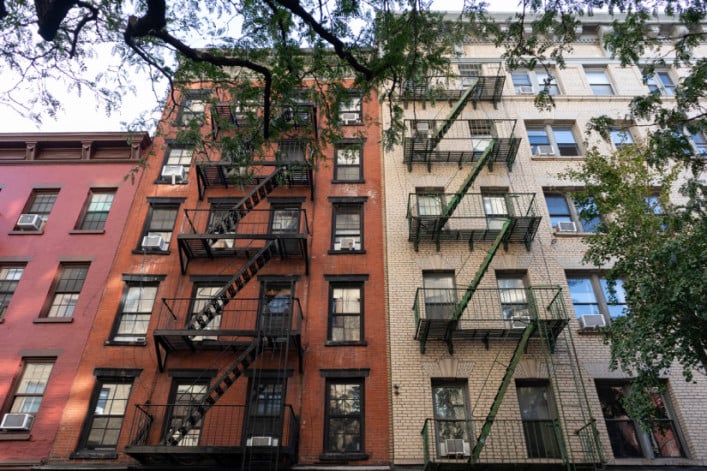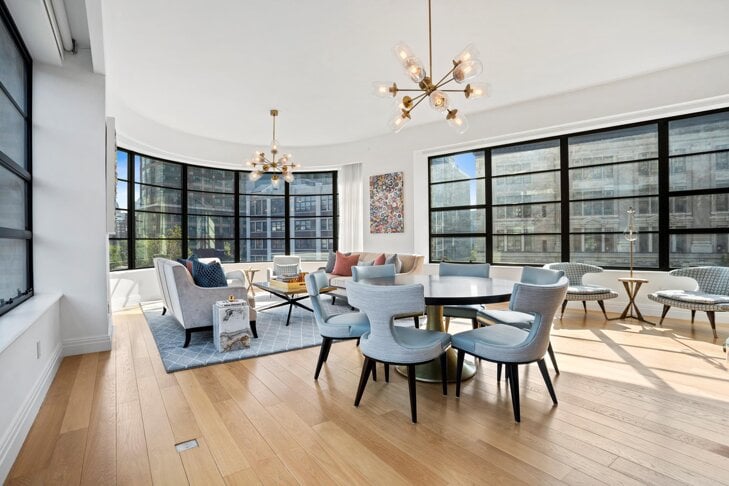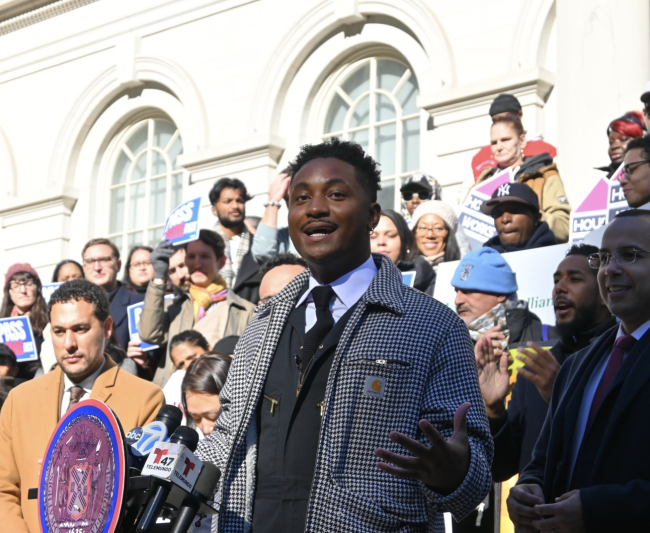The best way to find a rental in NYC: 15 tips for apartment hunters
- Try to avoid renting a place sight unseen; you risk falling for a bait-and-switch scam
- Visit your prospective building at late at night to see if there's excessive noise

To land a rental in NYC, you need to do your research, be persistent, and if necessary, pay even more than the landlord is asking.
iStock
Finding an apartment to rent in New York City is a challenging experience. Rents are high and bidding wars are prevalent for the upper half of the market, making apartment hunting an incredibly competitive undertaking.
To land a NYC apartment, you need to be persistent, do your research, and—if necessary—be prepared to pay even more than the landlord is asking—for example a few hundred more each month. Some renters make the offer through a broker or directly to the landlord. Or you may find yourself in a bidding war with other renters.
Paying more than the apartment is listed for may sound shocking, but “the reality is—it’s a landlord’s market,” said Gary Malin, chief operating officer at Corcoran.
Even if you’re an experienced NYC renter, there are strategies you should brush up on to track down the best deal and to avoid rushing into a lease and regretting it later. Read on for more advice.
[Editor’s note: A previous version of this article ran in June 2024. We are presenting it again with updated information for February 2025.]
1. If you're working with a broker, find a good one
Try to avoid renting a place sight unseen. You risk falling for a bait-and-switch scam, when prospective tenants are enticed with photos but find the apartment is really a different substandard one by the time they get the keys. If you use a virtual tour to check out apartments, make sure you are working with a reputable broker. Be sure to cross-check information (Google the address and the landlord's name to see what other renters are saying, or go to the apartment listing and review site openigloo). And ask the broker lots of questions.
Not all agents have shady intentions, but some disreputable ones try to attract clients by advertising too-good-to-be-true apartments that are not actually available (or at least not at that rent). For more on this, read: "Don’t fall for any of these real estate scams." Additionally, visiting a listing in an unfamiliar area or with a broker you’ve never met can put you in a vulnerable position. Consider your personal safety and read: "10 ways to stay safe while apartment hunting in NYC."
If you're using an agent to take you around the city and help you find a place, you can expect to pay a broker fee—and that practice will remain in effect when compensation for landlords' brokers undergoes a major change this summer.
Thanks to the FARE Act passed by the City Council in December 2024, starting in June 2025, landlords will pay fees for the brokers they hire to market their apartments, reversing the longstanding practice of passing broker fees to renters. But the Real Estate Board of New York, the powerful real estate lobby, has filed a lawsuit against the FARE Act and the outcome is not clear yet.
In the meantime, if you're determined to skip a broker's fee, here's a list of the best websites to find a no-fee rental.
2. Know what you want and ask lots of questions
Figure out what’s most important to you—whether it’s size, price, location, or amenities—and then determine where you’d be willing to compromise.
If you're dealing directly with an on-site leasing agent at a large, no-fee building, understand that even if there are 10 or 20 vacancies, you might only be told about two or three. (Owners typically hold apartments back from the market to put themselves in a better position to negotiate.) So make sure you are extremely clear about what you want—there may be another unit available that fits your needs even better.
Also, the leasing agent won't always volunteer information about any concessions—these are freebies like a free month or two or free access to building amenities—so remember to ask. They are more common when the market is slow or in a new building that is leasing up.
3. Get your paperwork prepared in advance
Brokers stress the importance of having all your paperwork ready to go. That means you need to have your most recent tax returns, two recent bank statements, a letter of employment or two recent pay stubs, and a scanned copy of your photo ID, as well as signed agency and fair housing disclosures.
Some landlords may ask for a letter of recommendation from your prior landlord. What they really want to know is whether you paid your rent on time. The second thing they want is to know if you're a quiet, clean neighbor.
If you have a pet, make sure you have a letter from the vet confirming they are up to date on vaccinations.
4. Line up a guarantor if you need one
If you don't meet the landlord's annual income requirement—usually at least 40 times the monthly rent—you might need to use a guarantor, who is someone who lives in the tri-state area and earns 80 times the monthly rent or has that in bank, savings, or a stock market account if they’re retired.
Usually this person is a close relative, but if you don’t have someone who can help out, you might be able to ask a friend or ask if your roommate has someone who can be the guarantor for both of you.
Another option is to use an institutional guarantor that will act as a guarantor for a fee, usually 70 to 90 percent of one month’s rent.
5. Know when and what to negotiate
Negotiating with a landlord is tough in a competitive market, or during the rental season’s busy summer months (May through August). But there are times when renters have the other hand. Some signs you have some leverage might include an apartment that has been on the market longer than normal (more than a week in a competitive market, and more than a month in a slow market); a problem of access to the apartment (the current tenant won't allow you to see it); or an apartment in bad condition.
But generally landlords have the advantage and many renters are being asked for best and final offers when there are multiple applications. Not all landlords will take the applicant offering the highest rent (renters need to be well-qualified too) but understanding the market—and knowing what comparable apartments are renting for—puts you in the best position to succeed.
Many renters find they have better success negotiating perks rather than rent—things like free gym membership or bike storage, or asking for a small improvement to the apartment such as replacing an appliance or having the floor refinished.

Brick Underground's
Gross Rent Calculator
What's this?
Some New York City landlords offer a free month (or more) at the beginning or end of a lease. The advertised rent is the net effective rent. The net effective rent is less than the amount you will actually have to pay --- known as your gross rent --- during your non-free months.
Brick Underground's Gross Rent Calculator enables you to easily calculate your gross rent, make quick apples-to-apples comparisons between apartments and avoid expensive surprises. All you'll need to figure out your gross rent is 1) the net effective rent, 2) the length of your lease, and 3) how many free months your landlord is offering. [Hint: Bookmark this page for easy reference!]
To learn more about net effective versus gross rents, read What does 'net effective rent' mean?.
If the landlord is offering partial months free, enter it with a decimal point. For example, 6 weeks free rent should be entered as 1.5 months.
6. Know the difference between advertised rent and what you’ll actually pay
When landlords offer concessions like a month or two of free rent to encourage you to sign a lease, they advertise the net effective rent. The net effective rent includes a discount, while the gross rent is what the landlord is charging you without the discount. It's vitally important to keep both numbers in mind.
Not all landlords handle net effective rent the same way. Sometimes the discount is deducted from your gross rent over the term of the lease (so a portion would be deducted from each month of a 12-month lease). Other times you pay the gross rent and get your free month either at the beginning or end of your lease.
When you renew your lease, your concession goes away and you will be asked to pay the gross rent, plus any rent increase.
To calculate your gross rent, use Brick Underground’s gross rent calculator.
7. Manage expectations about noise and pets
Landlords will be hesitant to rent to anyone they think will make a lot of noise, so you may not want to mention, for example, your need to rehearse your saxophone to a prospective landlord or even to your rental agent, who has a long-term interest in keeping the landlord happy.
Obviously, you need to be a good, respectful neighbor, so you can’t have a jam session whenever you want. If you have noisy kids or play an instrument, you might want to consider a ground-level apartment or install extra soundproofing.
Have a pet? Many landlords eased their restrictions on pets and bigger dog breeds during the pandemic, so finding an apartment where dogs are allowed isn't as hard as it used to be. That said, even if an apartment is advertised as pet-friendly, some dogs above a certain weight (typically 30-50 pounds) may be restricted. Some buildings may even want to screen your dog before you move in (it will be a temperament assessment, behavior training, or another type of evaluation) to ensure they’ll be a good resident.
8. Consider renting a co-op or condo
The application process in a co-op or condo is slower, because you have to pass a board interview, and it can be more expensive as a result of higher, one-time fees, but renting a condo or a co-op can give you an apartment with higher-quality finishes and nicer amenities in a better maintained building.
Most co-op buildings restrict the length of time owners can rent out their units to two years in any seven-to-10-year period, so if you're looking for a more permanent living situation, a condo or regular rental building is a better option. Some condos have term limits too, but they're less strict for the most part.
Make sure your application has been approved by the board (not just the owner) or you can be kicked out after you've moved in. Also, be sure to ask if, as a renter, you will be excluded from any amenities like bike storage, roof deck, or gym, or from having pets.
9. Tap your personal networks
Your personal and professional networks can help you in your apartment search. Let your friends and colleagues know what you are looking for either through social media or in conversation.
You may be uncomfortable revealing your needs and your budget to a wider circle, but it's also possible an owner prefers renting to someone they are connected to rather than a complete stranger.
10. Look for a sublet or lease takeover
Most renters in NYC can legally sublet their apartments for a minimum of 30 days—even if their lease says otherwise—so long as certain procedures are followed and the landlord is notified in writing of the intention to sublet. The leaseholder remains responsible for the rent and for any damage to the apartment.
A lease takeover, also known as a lease assignment, is different. The lease is assigned to a new renter, who must be approved by the landlord and have their finances and background checked. The original tenant is no longer responsible for rent or damages, and the new tenant gets an apartment for the remainder of the lease term without paying a broker fee. There’s often an option to sign a new lease when the original one expires, though not necessarily at the same rent.
11. Check the building amenities against your lease
If your building has a roof deck, gym, bike storage, or other amenities, make sure your access (and any fees) are included in the lease. Sometimes you can ask for the management company to waive the fees.
12. Know your bed bug rights
If you’ve never experienced bed bugs, you want to keep it that way. You are legally entitled to a written disclosure of the building's bed bug history when you sign a lease. To spare yourself a headache, ask about the bed bug history up front. You can't be sure you're going to get an honest answer, but it can't hurt to come across as aware and proactive. (For more, check out: How to research the bed bug history of any rental apartment.)
13. Know how to assess a building for kid-friendliness
Looking for a building with lots of families—or one with a more adults-only vibe? Anti-housing discrimination laws prevent real estate agents from discussing whether a building is family friendly or not (or even whether the local schools are good.)
Signs of a kid-friendly building include lots of family-sized apartments (two bedrooms and up) and a well-tended playroom.
You can also speak to the doorman or park yourself outside the building before or after school to see if you notice families coming in or out of the building.
14. Perform a late-night soundcheck
Before you sign your lease, visit the building late at night (with a friend, if necessary) to see if any rooftop bars or nightclubs might pose a threat to your peace and quiet. It might not be a deal breaker: Street noise can often be mitigated with some soundproofing.
You should also check to see if construction is coming to your block to avoid unexpected noise during the day, which can be a pain if you’re working from home.
15. Consider a temporary, short-term rental
If you need somewhere temporary to stay, you might consider a short-term rental. Short-term corporate rental apartments can work if you are in-between apartments or renovating your place. Be warned, there are lots of scams out there.
For more information, read: "How to rent a short-term, furnished apartment in NYC without getting scammed."
Need more tips and practical advice for bringing your A-game to your search? Read "How to move to NYC: A crash course in finding an apartment here" and Brick Underground's step-by-step guide to renting in NYC.
You Might Also Like




























